 W
WAbbey Road is the eleventh studio album by the English rock band the Beatles, released on 26 September 1969 by Apple Records. Named after the location of EMI Studios in London, the cover features the group walking across the street's zebra crossing, an image that became one of the most famous and imitated in popular music. The album's initially mixed reviews were contrasted by its immediate commercial success, topping record charts in the UK and US. The lead single "Something" / "Come Together" was released in October and topped the US charts.
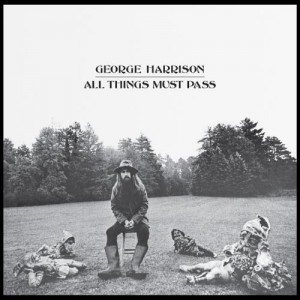 W
WAll Things Must Pass is the third studio album by English rock musician George Harrison. Released as a triple album in November 1970, it was Harrison's first solo work after the break-up of the Beatles in April that year. It includes the hit singles "My Sweet Lord" and "What Is Life", as well as songs such as "Isn't It a Pity" and the title track that had been overlooked for inclusion on releases by the Beatles. The album reflects the influence of Harrison's musical activities with artists such as Bob Dylan, the Band, Delaney & Bonnie and Friends and Billy Preston during 1968–70, and his growth as an artist beyond his supporting role to former bandmates John Lennon and Paul McCartney. All Things Must Pass introduced Harrison's signature slide guitar sound and the spiritual themes present throughout his subsequent solo work. The original vinyl release consisted of two LPs of songs and a third disc of informal jams titled Apple Jam. Several commentators interpret Barry Feinstein's album cover photo, showing Harrison surrounded by four garden gnomes, as a statement on his independence from the Beatles.
 W
WApproximately Infinite Universe is a double album by Yoko Ono, released in early 1973 on Apple Records. It represents a departure from the experimental avant garde rock of her first two albums towards a more conventional pop/rock sound, while also dabbling in feminist rock. It peaked at number 193 in the United States. The 1997 CD reissue on Rykodisc added two acoustic demos of songs from this era, that were later released on 1981's Season of Glass. It was released again by Rykodisc in 2007.
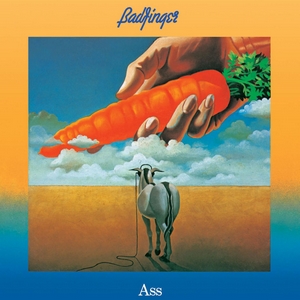 W
WAss is the fifth studio album by British rock band Badfinger, and their last album released on Apple Records. The opening track, "Apple of My Eye", refers to the band leaving the label to begin its new contract with Warner Bros. Records.
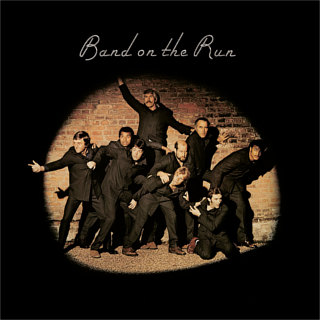 W
WBand on the Run is the third studio album by the British–American rock band Paul McCartney and Wings, released in December 1973. It was McCartney's fifth album after leaving the Beatles in April 1970. Although sales were modest initially, its commercial performance was aided by two hit singles – "Jet" and "Band on the Run" – such that it became the top-selling studio album of 1974 in the United Kingdom and Australia, in addition to revitalising McCartney's critical standing. It remains McCartney's most successful album and the most celebrated of his post-Beatles works.
 W
WThe Beatles, also known as the White Album, is the ninth studio album and only double album by English rock band the Beatles, released on 22 November 1968. Its plain white sleeve contains no graphics or text other than the band's name embossed, which was intended as a direct contrast to the vivid cover artwork of the band's previous LP Sgt. Pepper's Lonely Hearts Club Band. The Beatles is recognised for its fragmentary style and diverse range of genres, including folk, British blues, ska, music hall and the avant-garde. It has since been viewed by some critics as a postmodern work, as well as among the greatest albums of all time.
 W
WBeaucoups of Blues is the second studio album by the English rock musician and former Beatle Ringo Starr. It was released in September 1970, five months after his debut solo album, Sentimental Journey. Beaucoups of Blues is very far removed in style from its pop-based predecessor, relying on country and western influences. A longtime fan of the genre, Starr recorded the album over three days in Nashville with producer Pete Drake and an ensemble of local session players. Beaucoups of Blues failed to chart in Britain but achieved moderate commercial success in the United States, where it reached number 35 on Billboard's Country Albums list and number 65 on the Billboard Top LPs chart.
 W
WBrother is the debut album by the American pop-rock duo Lon & Derrek Van Eaton. It was released on the Beatles' Apple record label in September 1972 in the United States and February 1973 in Britain. It includes the single "Sweet Music", produced by George Harrison, and was otherwise produced by Klaus Voormann, a friend and longtime associate of the Beatles. On release, the album received favorable reviews from music critics but failed to achieve commercial success. Rolling Stone critic Stephen Holden hailed it as a "staggeringly impressive first album".
 W
WA Celtic Requiem is a requiem by the English composer John Tavener, written in 1969. It is written for soprano, children's choir and orchestra.
 W
WDark Horse is the fifth studio album by English rock musician George Harrison. It was released on Apple Records in December 1974 as the follow-up to Living in the Material World. Although keenly anticipated on release, Dark Horse is associated with the controversial North American tour that Harrison staged with Indian classical musician Ravi Shankar in November and December that year. This was the first US tour by a member of the Beatles since 1966, and the public's nostalgia for the band, together with Harrison contracting laryngitis during rehearsals and choosing to feature Shankar so heavily in the programme, resulted in scathing concert reviews from some influential music critics.
 W
WDoris Troy is an album released in 1970 on the Beatles' Apple Records label by American soul singer Doris Troy. It features songs written by Troy and a number of the participants on the sessions, including George Harrison, Stephen Stills, Klaus Voormann and Ringo Starr. Through the extended period of recording, the album became an all-star collaborative effort, typical of many Apple projects during 1968–70, although it was Troy's only album on the Beatles' label. Other guest musicians included Billy Preston, Peter Frampton, Leon Russell, Eric Clapton and members of the Delaney & Bonnie Friends band. Like the Harrison-produced single "Ain't That Cute", Doris Troy failed to chart in Britain or America on release.
 W
WElectronic Sound is the second studio album by English rock musician George Harrison. Released in May 1969, it was the last of two LPs issued on the Beatles' short-lived Zapple record label, a subsidiary of Apple Records that specialised in the avant-garde. The album is an experimental work comprising two lengthy pieces performed on a Moog 3-series synthesizer. It was one of the first electronic music albums by a rock musician, made at a time when the Moog was usually played by dedicated exponents of the technology. Harrison subsequently introduced the Moog to the Beatles' sound, and the band featured synthesizer for the first time on their 1969 album Abbey Road.
 W
WEncouraging Words is the fifth studio album by American soul musician Billy Preston, released in September 1970 on Apple Records. It was the last of Preston's two albums for the Beatles' Apple label, after which he moved to A&M Records. The album was co-produced by George Harrison and Preston. Harrison's songs "All Things Must Pass" and "My Sweet Lord" were issued here for the first time, two months before his own recordings appeared on his triple album All Things Must Pass.
 W
WExtra Texture is the sixth studio album by English musician George Harrison, released on 22 September 1975. It was Harrison's final album under his contract with Apple Records and EMI, and the last studio album issued by Apple. The release came nine months after his troubled 1974 North American tour with Ravi Shankar and the poorly received Dark Horse album.
 W
WFeeling the Space is Yoko Ono's fourth solo album, her last one on Apple Records.
 W
WFly is the second album by Yoko Ono, produced by her and John Lennon, and released in 1971. It was a complete avant-garde/Fluxus package in a gatefold sleeve that came with a full-size poster and a postcard to order Ono's 1964 book Grapefruit. Notable songs include the singles "Midsummer New York" and "Mrs. Lennon", "Hirake" aka "Open Your Box" and "Don't Worry, Kyoko ", dedicated to Ono's daughter Kyoko Cox. "Airmale" is the soundtrack to Lennon's film Erection, showing a building being erected in time lapsed photography, while "Fly" is the soundtrack to Lennon and Ono's 1970 film Fly.
 W
WLet It Be is the twelfth and final studio album by the English rock band the Beatles. It was released on 8 May 1970, almost a month after the group's break-up, in tandem with the motion picture of the same name. Like most of the band's previous releases, the album topped record charts in many countries, including both the US and the UK. However, the critical response was generally unfavourable, and Let It Be came to be regarded as one of the most controversial rock albums in history.
 W
WGoodnight Vienna is the fourth studio album by Ringo Starr. It was recorded in the summer of 1974 in Los Angeles, and released later that year. Goodnight Vienna followed the commercially successful predecessor Ringo, and Starr used many of the same players, including Billy Preston, Klaus Voormann, Robbie Robertson, Harry Nilsson, and producer Richard Perry. The title is a Liverpool slang phrase meaning "it's all over".
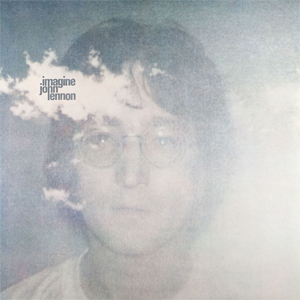 W
WImagine is the second studio album by English musician John Lennon, released on 9 September 1971 by Apple Records. Co-produced by Lennon, his wife Yoko Ono and Phil Spector, the album's lush sound contrasts the basic, small-group arrangements of his first album, John Lennon/Plastic Ono Band (1970), while the opening title track is widely considered to be his signature song.
 W
WJames Taylor is the self-titled debut studio album by American singer-songwriter James Taylor. Released on December 6, 1968, it was the first recording by a non-British artist released by Apple Records, and would also be Taylor's only release on that label. The album was released under the title First Album on the South African market.
 W
WLet It Be is the twelfth and final studio album by the English rock band the Beatles. It was released on 8 May 1970, almost a month after the group's break-up, in tandem with the motion picture of the same name. Like most of the band's previous releases, the album topped record charts in many countries, including both the US and the UK. However, the critical response was generally unfavourable, and Let It Be came to be regarded as one of the most controversial rock albums in history.
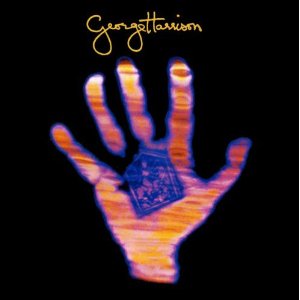 W
WLiving in the Material World is the fourth studio album by English musician George Harrison, released in 1973 on Apple Records. As the follow-up to 1970's critically acclaimed All Things Must Pass and his pioneering charity project, the Concert for Bangladesh, it was among the most highly anticipated releases of that year. The album was certified gold by the Recording Industry Association of America two days after release, on its way to becoming Harrison's second number 1 album in the United States, and produced the international hit "Give Me Love ". It also topped albums charts in Canada and Australia, and reached number 2 in Britain.
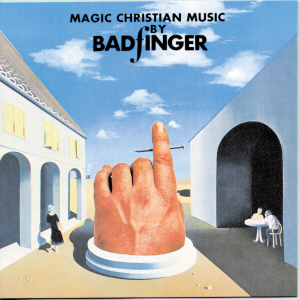 W
WMagic Christian Music is the first studio album by the British rock band Badfinger, released in early 1970 on Apple Records. The band had previously released the album Maybe Tomorrow, in 1969, under the name The Iveys. Three tracks from the LP are featured in the film The Magic Christian, which also gives the album its title. However, Magic Christian Music is not an official soundtrack album for the film.
Maybe Tomorrow is the only album released by the British group The Iveys, who later renamed themselves Badfinger. It was issued in 1969 on the Apple label in Japan, West Germany and Italy. Although the album was scheduled to be released worldwide, the release in the US and UK at that time was halted without explanation. Many reasons for halting the album have been suggested by the band and Apple employees, but the most common theory is that Apple's newly hired president, Allen Klein, stopped all non-Beatle releases on Apple until he could examine the company's finances, which were in disarray at the time.
 W
WMcCartney is the debut solo album by English musician Paul McCartney, released on 17 April 1970 by Apple Records. McCartney recorded it in secrecy, mostly using basic home-recording equipment at his house in St John's Wood. Mixing and some recording took place at professional London studios. In its loosely arranged performances, McCartney eschewed the polish of the Beatles' past records in favour of a lo-fi style. Apart from occasional contributions by his wife, Linda, McCartney performed the entire album alone by overdubbing on four-track tape.
 W
WMind Games is the fourth studio album by English musician John Lennon. It was recorded at Record Plant Studios in New York in summer 1973. The album was released in the US on 29 October 1973 and in the UK on 16 November 1973. It was Lennon's first self-produced recording without help from Phil Spector. Like his previous album, the politically topical and somewhat abrasive Some Time in New York City, Mind Games received mixed reviews upon release. It reached number 13 in the UK and number 9 in the US, where it was certified gold.
 W
WNo Dice is the third studio album by British rock band Badfinger, issued by Apple Records and released on 9 November 1970. Their second album under the Badfinger name and first to include guitarist Joey Molland, No Dice significantly expanded the British group's popularity, especially abroad. The album included both the hit single "No Matter What" and the song "Without You", which would become a big hit for Harry Nilsson, and later a hit for Mariah Carey.
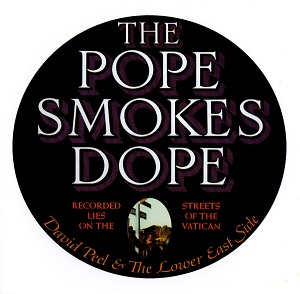 W
WThe Pope Smokes Dope is the third album by David Peel and the Lower East Side, released on April 17, 1972 through Apple Records.
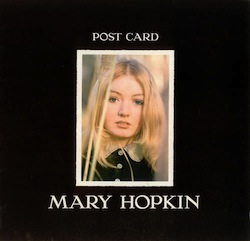 W
WPost Card is the debut album by Mary Hopkin. It was produced by Paul McCartney and released by Apple Records in February 1969 in the UK and in March 1969 in the US. It reached number 3 in the UK and number 28 in the US. It also reached number 24 in Canada. The original US and Canadian versions differed from the UK version by including the hit single "Those Were the Days" instead of a cover of "Someone to Watch Over Me".
 W
WThe Radha Krsna Temple is a 1971 album of Vedic devotional songs recorded by the UK branch of the Hare Krishna movement – more formally, the International Society for Krishna Consciousness (ISKCON) – who received the artist credit of "Radha Krishna Temple (London)". The album was produced by George Harrison and released on the Beatles' Apple record label. It compiles two hit singles, "Hare Krishna Mantra" and "Govinda", with other Sanskrit-worded mantras and prayers that the Temple devotees recorded with Harrison from July 1969 onwards.
 W
WRam is the only studio album credited to both English musician Paul McCartney and his wife Linda McCartney, released in May 1971 by Apple Records. It was recorded in New York with guitarists David Spinozza and Hugh McCracken, and future Wings drummer Denny Seiwell. Three singles were issued from the album: "Uncle Albert/Admiral Halsey", "The Back Seat of My Car" and "Eat at Home". The recording sessions also yielded the non-album single "Another Day".
 W
WRed Rose Speedway is the second studio album by the British–American rock band Wings, although credited to "Paul McCartney and Wings". The album was released by Apple Records in April 1973, preceded by its lead single, the ballad "My Love". By including McCartney's name in the artist credit, the single and album broke with the tradition of Wings' previous records. The change was made in the belief that the public's unfamiliarity with the band had been responsible for the weak commercial performance of the group's 1971 debut album Wild Life.
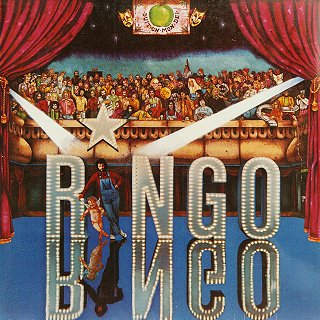 W
WRingo is the third studio album by English musician Ringo Starr, released in 1973 on Apple Records. It peaked at No. 7 on the UK Albums Chart and No. 2 on the Billboard 200, and has been certified platinum by the RIAA. In Canada, it reached No. 1 on the RPM national albums chart.
 W
WRock 'n' Roll is the sixth studio album by English musician John Lennon. Released in February 1975, it is an album of late 1950s and early 1960s songs as covered by Lennon. Recording the album was problematic and spanned an entire year: Phil Spector produced sessions in October 1973 at A&M Studios, and Lennon produced sessions in October 1974 at the Record Plant (East). Lennon was being sued by Morris Levy over copyright infringement of one line in his song "Come Together". As part of an agreement, Lennon had to include three Levy-owned songs on Rock 'n' Roll. Spector disappeared with the session recordings and was subsequently involved in a motor accident, leaving the album's tracks unrecoverable until the beginning of the Walls and Bridges sessions. With Walls and Bridges coming out first, featuring one Levy-owned song, Levy sued Lennon expecting to see Lennon's Rock 'n' Roll album.
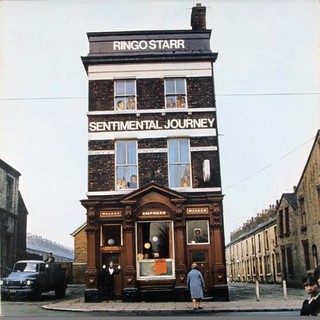 W
WSentimental Journey is the debut album by English rock musician Ringo Starr. It was released by Apple Records in March 1970 as the Beatles were breaking up. The album is a collection of pre-rock 'n' roll standards that Starr recalled from his childhood in Liverpool. As a departure from the experimental quality that had characterised solo LPs by George Harrison and John Lennon since 1968, it was the first studio album by an individual Beatle to embrace a popular music form.
 W
WSome Time in New York City is a part-studio, part-live double album by John Lennon and Yoko Ono, with the American rock band Elephant's Memory. Released in June 1972 in the US and in September 1972 in the UK on Apple Records, it is the third album to bear Lennon's name since he left the Beatles, and his fourth with Ono. Like Lennon's previous solo albums, it was co-produced by Lennon, Ono and Phil Spector. The album's lyrics are very politically charged compared to its predecessors, discussing political and social issues and topics such as sexism, incarceration, colonialism, and racism.
 W
WSpace is an album by American jazz group the Modern Jazz Quartet featuring performances recorded in 1969 and released on the Apple label.
 W
WStraight Up is the fourth studio album by the British rock band Badfinger, released in December 1971 in the United States and February 1972 in Britain. Issued on the Beatles' Apple record label, it includes the hit singles "Day After Day" and "Baby Blue", and the similarly popular "Name of the Game", all of which were written by singer and guitarist Pete Ham. The album marked a departure from the more rock-oriented sound of Badfinger's previous releases, partly as a result of intervention by Apple Records regarding the band's musical direction.
 W
WThat's The Way God Planned It is the fourth studio album by American musician Billy Preston, released in August 1969 on Apple Records. The album followed Preston's collaboration with the Beatles on their "Get Back" single and was produced by George Harrison. The title track became a hit in the UK when issued as a single. Aside from Harrison, other contributors to the album include Keith Richards, Eric Clapton and Doris Troy.
 W
WUnder the Jasmin Tree is an album by American jazz group the Modern Jazz Quartet featuring performances recorded in December 1967 and released on the Apple label. The album was the fourth release on the Beatles' new label and the MJQ were the only jazz act to record for Apple.
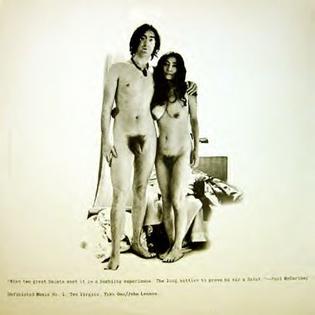 W
WUnfinished Music No. 1: Two Virgins is the first of three experimental albums released by John Lennon and Yoko Ono on Apple Records. It was the result of an all-night session of musical experimentation with Yoko in John's home studio at Kenwood, while his wife, Cynthia Lennon, was on holiday in Greece. Lennon and Ono's 1968 debut recording is known not only for its avant-garde content, but also for its cover which features the couple naked. This made the album controversial to both the public and the parent record company EMI, which refused to distribute it. In an attempt to avoid controversy, the LP record was sold in a brown paper bag, and distributed by Track and Tetragrammaton in the United Kingdom and the United States respectively. Two Virgins, while failing to chart in the UK, reached number 124 in the US. The album was followed six months later by Unfinished Music No. 2: Life with the Lions.
 W
WUnfinished Music No. 2: Life with the Lions is the second of three experimental albums of avant-garde music by John Lennon and Yoko Ono, released in May 1969 on Zapple, a sub label of Apple. It was a successor to 1968's highly controversial Unfinished Music No. 1: Two Virgins, and was followed by the Wedding Album. The album peaked in the United States at number 174, 50 places lower than the previous album. The album, whose title is a play on words of the BBC Radio show Life with The Lyons, was recorded at Queen Charlotte's Hospital in London and live at Cambridge University, in November 1968 and March 1969, respectively. The Cambridge performance, to which Ono had been invited and to which she brought Lennon, was Lennon and Ono's second as a couple. A few of the album's tracks were previewed by the public, thanks to Aspen magazine. The album was remastered in 1997.
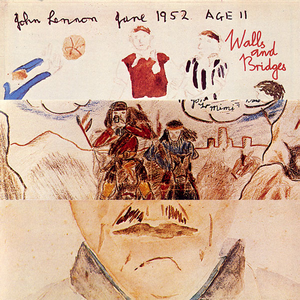 W
WWalls and Bridges is the fifth studio album by English musician John Lennon. It was issued by Apple Records on 26 September 1974 in the United States and on 4 October in the United Kingdom. Written, recorded and released during his 18-month separation from Yoko Ono, the album captured Lennon in the midst of his "Lost Weekend". Walls and Bridges was an American number-one album on both the Billboard and Record World charts and included two hit singles, "Whatever Gets You thru the Night" and "#9 Dream". The first of these was Lennon's first number-one hit in the United States as a solo artist, and his only chart-topping single in either the US or Britain during his lifetime.
 W
WWedding Album is the third and final in a succession of three experimental albums by John Lennon and Yoko Ono. It followed Unfinished Music No. 1: Two Virgins and Unfinished Music No. 2: Life with the Lions. In Britain, the album was released credited by "John and Yoko", without last names mentioned. In America, it was released credited by "John Ono Lennon & Yoko Ono Lennon."
 W
WThe Whale is a "dramatic cantata" written by the English composer John Tavener in 1966.
 W
WWild Life is the debut studio album by the British–American rock band Wings and the third studio album by Paul McCartney after the breakup of the Beatles. The album was recorded in eight days, from 25 July to 2 August 1971, at Abbey Road Studios by McCartney, his wife Linda, session drummer Denny Seiwell, whom they had worked with on the McCartney's previous album Ram, and guitarist Denny Laine, formerly of the English rock band the Moody Blues. It was released by Apple Records on 7 December in the UK and US, to lukewarm critical and commercial reaction.